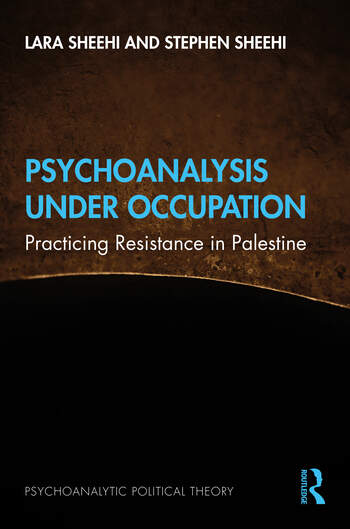Register here for Thursday’s talk Psychoanalysis and Liberation: Four Arguments
This review by Ian Parker of Psychoanalysis Under Occupation: Practicing Resistance in Palestine, which was already reviewed by Ian for ACR, appears in the latest issue of Asylum: Magazine for Radical Mental Health.
Psychoanalysis is too-often an elite private practice that works hand-in-glove with medical psychiatry, and so it would be very difficult to say that it really functions as a radical approach to mental health in the English-speaking world. But many of the leaders of the so-called ‘anti-psychiatry’ movement were profoundly influenced by psychoanalysis, and looked to it as an alternative to psychiatry. Indeed, key figures, whose work we often refer to in Asylum Magazine, trained as psychoanalysts; they include R D Laing and Thomas Szasz.
Radical psychoanalysts who are in tune with the work of Asylum are a minority. They have often argued that there are other non-psychiatric and anti-psychiatric traditions of psychoanalysis outside the English-speaking world, most notably in Latin America, as well as a hidden radical tradition in the early history of psychoanalysis around Freud in Europe.

This book strengthens that argument, but it does so by showing us something very different and very surprising. Instead of giving us the usual history of how psychoanalysis arrived in Palestine as something brought there by those who were fleeing the Nazis and setting up the Israeli state, Lara Sheehi and Stephen Sheehi tell a hidden story. Psychoanalysis had actually been in the Arab world for a long time, as an independent strand of work, and is now at work in many places, including Palestine.
The Sheehis, who are from the Lebanon and writing in solidarity with radical Palestinian mental health activists, are inspired by ‘liberation psychology’ developed in Latin America and, most importantly in the work of Frantz Fanon. Frantz Fanon was from Martinique, an overseas French territory, and experienced first-hand the effects of colonialism and racism before training as a psychiatrist and then working in Algeria. He became part of the Algerian independence struggle, and developed analyses, ‘psycho-analyses’ based on his clinical work, of the deep effects of racism on those who are colonised, oppressed, and who then experience that racism as mental distress.
Fanon was not perfect, but he bit-by-bit broke from medical psychiatry, and he is a key figure in our own history as radicals searching for ‘radical mental health’. A key lesson this book draws from Fanon’s work is that, instead of focusing on what we cannot do and on the victim status of the colonised as those who have been subject to ‘trauma’, radical mental health practitioners need to focus on collective strength, on an identity that is steadfast, and able to speak of the experience of occupation.
This book describes resistance under occupation, giving voice to radical practitioners who are concerned with addressing the unconscious aspects of oppression and how it is possible to fight back. Through a detailed passionate, angry and inspiring account of the work of these non-medical practitioners we hear the voices of patients who become more, much more, than the Israeli state wants them to be. They are no longer victims but active agents.
We need to note a paradox which is that, like expensive private practice psychoanalysis in the English-speaking world, this book is very expensive. But we still have libraries as public spaces, and we still have pirate sites that enable people to obtain books they cannot afford. Ask for this book, borrow or steal it, why not? The more the word gets out about how it is possible to resist occupation in Palestine, the more likely this book will be published in paperback and then it will be even more widely circulated.
This is not psychoanalysis as you know it, and reading it will open your eyes to the many undiscovered possible alliances we could build with the oppressed.
Art Book Review Books Campism Capitalism China Climate Emergency Conservative Government Conservative Party COVID-19 Creeping Fascism Economics EcoSocialism Elections Europe Far-Right Fascism Film Film Review Fourth International France Gaza History Imperialism Iran Israel Italy Keir Starmer Labour Party Long Read Marxism Marxist Theory Migrants Palestine pandemic Police Protest Russia Solidarity Statement Trade Unionism Trans*Mission Ukraine United States of America War

